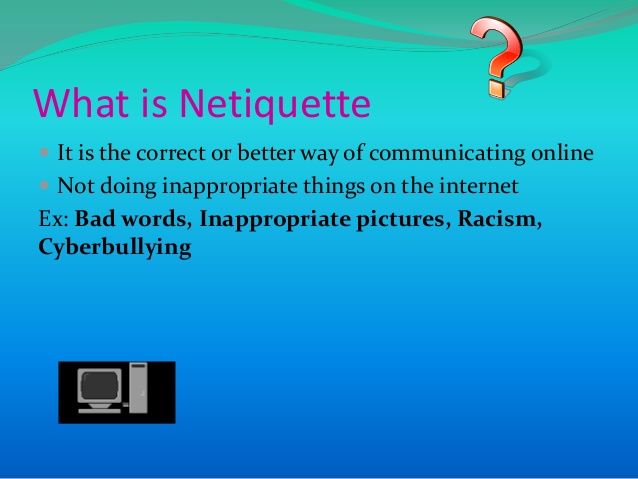
It’s always great to share jokes with others and it is important to be yourself online and let your personality shine through. Think if you were to receive this comment how would you have felt?
#Define netiquette Offline
We also have the opportunity to re-phrase what we say if we’re misunderstood in the offline world. In the real world we have the addition of body language, tone of voice and facial expressions to help us understand what someone has said. Be aware of how your comments might be read: Strong language, capital letters, and exclamation marks can be easily misinterpreted online.If you wouldn’t say it to someone’s face, the internet is not the place to say it either.

You may wish to comment on something someone has shared but always remember that behind every account is a real person. Everyone has different feelings and opinions and it is important to respect this online. Here are 7 top tips to help young people with online etiquette: With so much of their lives playing out online, it is important for young people to consider how their online behaviour and choices can have an impact on themselves, and others. Netiquette for Kids, created 2001 by Boston Public Library, is licensed under a Creative Commons Attribution-ShareAlike 3.0 Unported License.The internet often plays a huge part in many young people’s daily activities allowing them to communicate freely with others and share information with ease via messaging apps, social media and gaming networks.Īt any one time they can be navigating a whole host of different apps, with some of the most popular ones being Snapchat, Instagram and WhatsApp. Who knows? They might show you a thing or two someday! Other kids, or even your parents and teachers, may need help understanding what it’s all about. The Net is growing quickly, and it’s difficult to keep up.

Taking things which are not yours (such as files, passwords, or credit card numbers), spreading rumors about other people online, and infecting other computers with viruses (on purpose) are examples of harming other people online. Avoid using the computer to harm other people. Be responsible online.When you are at the computer, you are in control.Passwords and personal information are private, and are never safe to share with others.
#Define netiquette password
Sharing your own password with someone else, even someone you like, is never a good idea.
#Define netiquette full
This includes passwords, full names, addresses, or interests. Respect the privacy of other people.If someone tells you something secret, it should be kept secret.If you join the discussion just for the fun of “crashing” it, or ruining it, people will definitely get angry. This can be done on a listserv, a bulletin board, a chat group, etc. Avoid “crashing” discussion groups or forums.People on the Net frequently get together online to talk about things they may have in common.Try being calm, ignoring the message, or sending a polite message asking for them to explain what they meant. Even if you are angry with someone, you don’t need to take things any further. If someone insults you, be calm.Starting a flame war is serious business on the Net.

If you insult someone with e-mail, they will probably get angry just as they would if you insulted them face to face. Sometimes this can be done by sending so many messages that a mailbox gets jammed, and sometimes this is done by sending a few very nasty messages meant to hurt someone’s feelings.



 0 kommentar(er)
0 kommentar(er)
